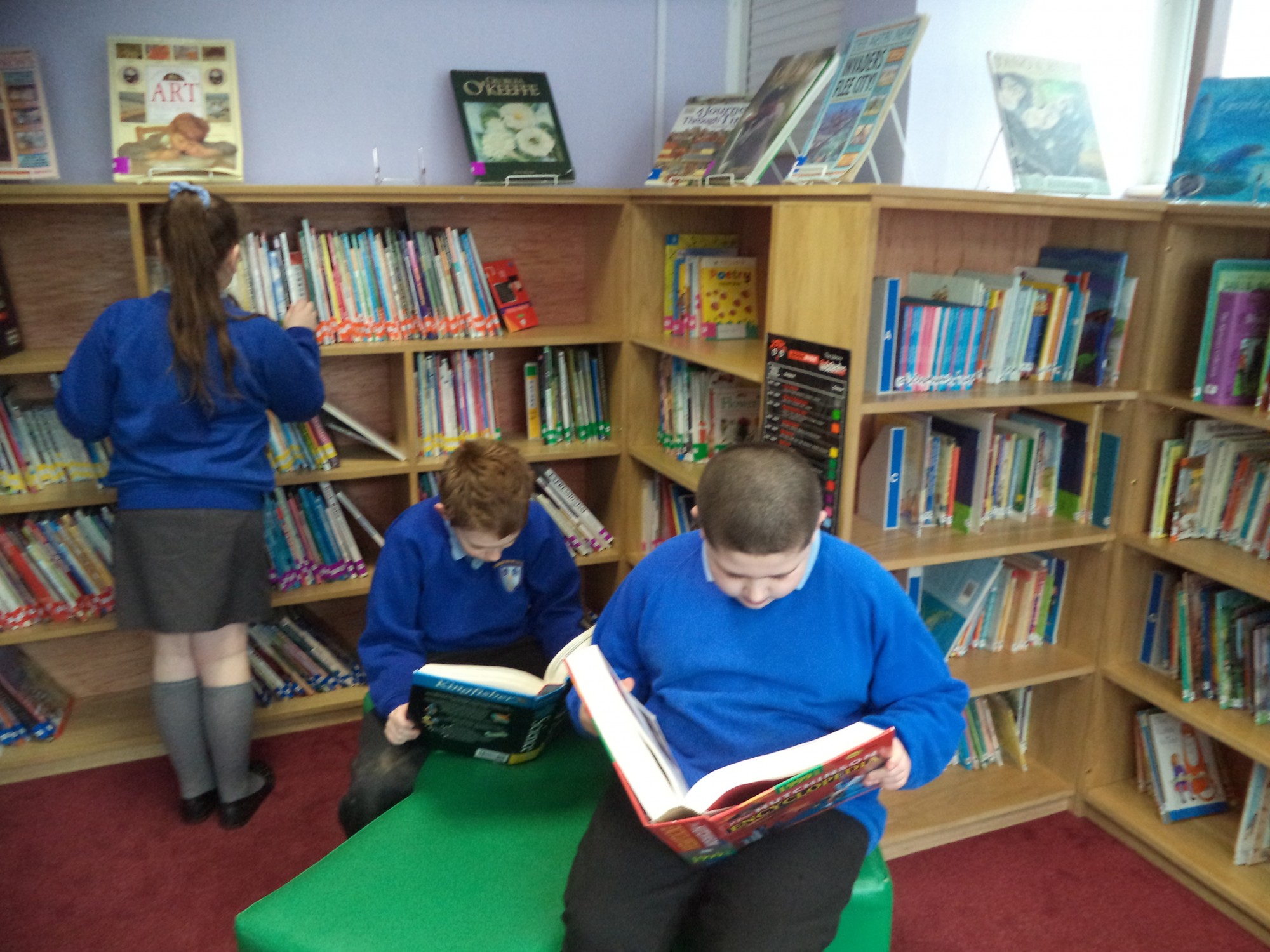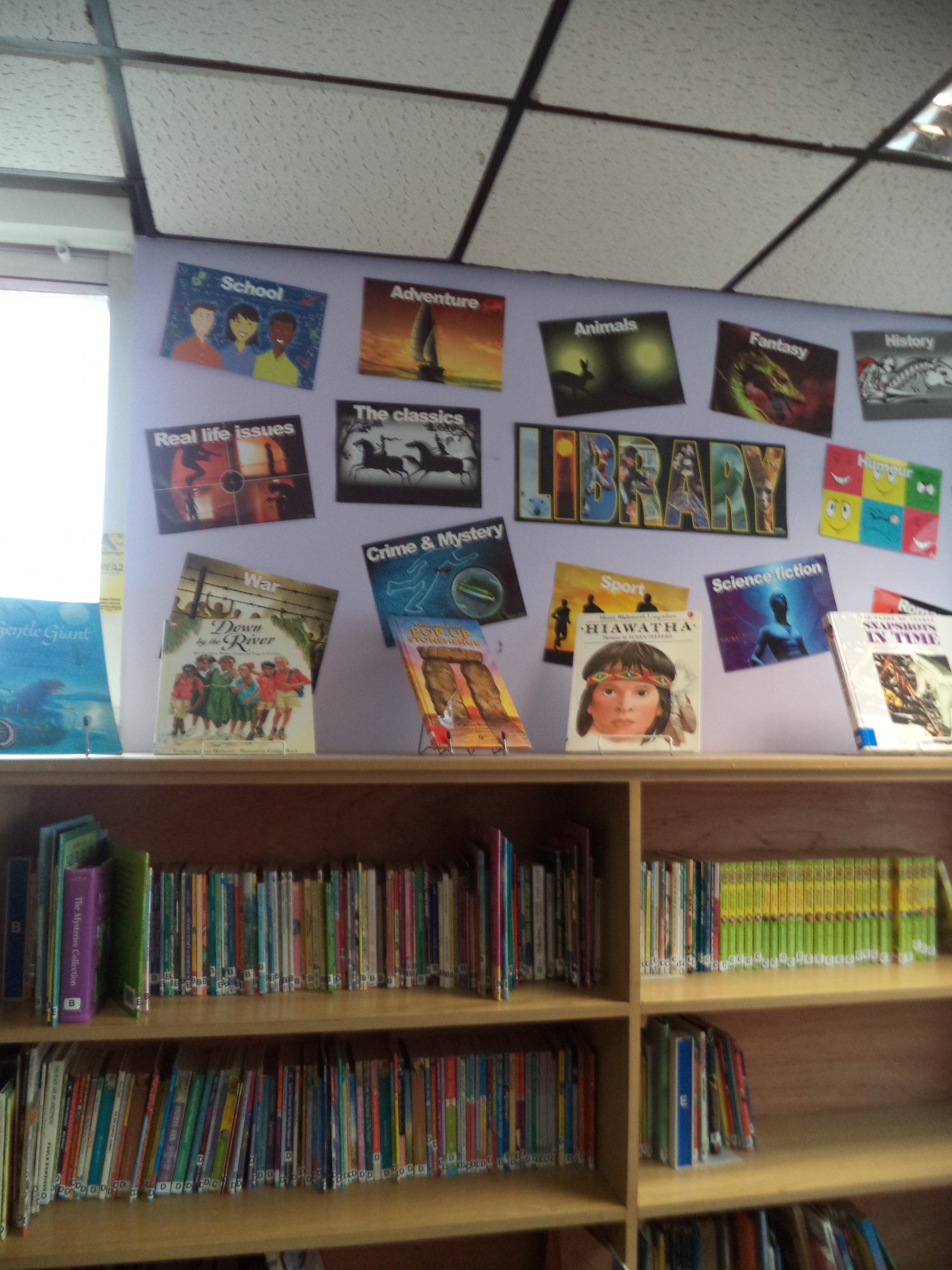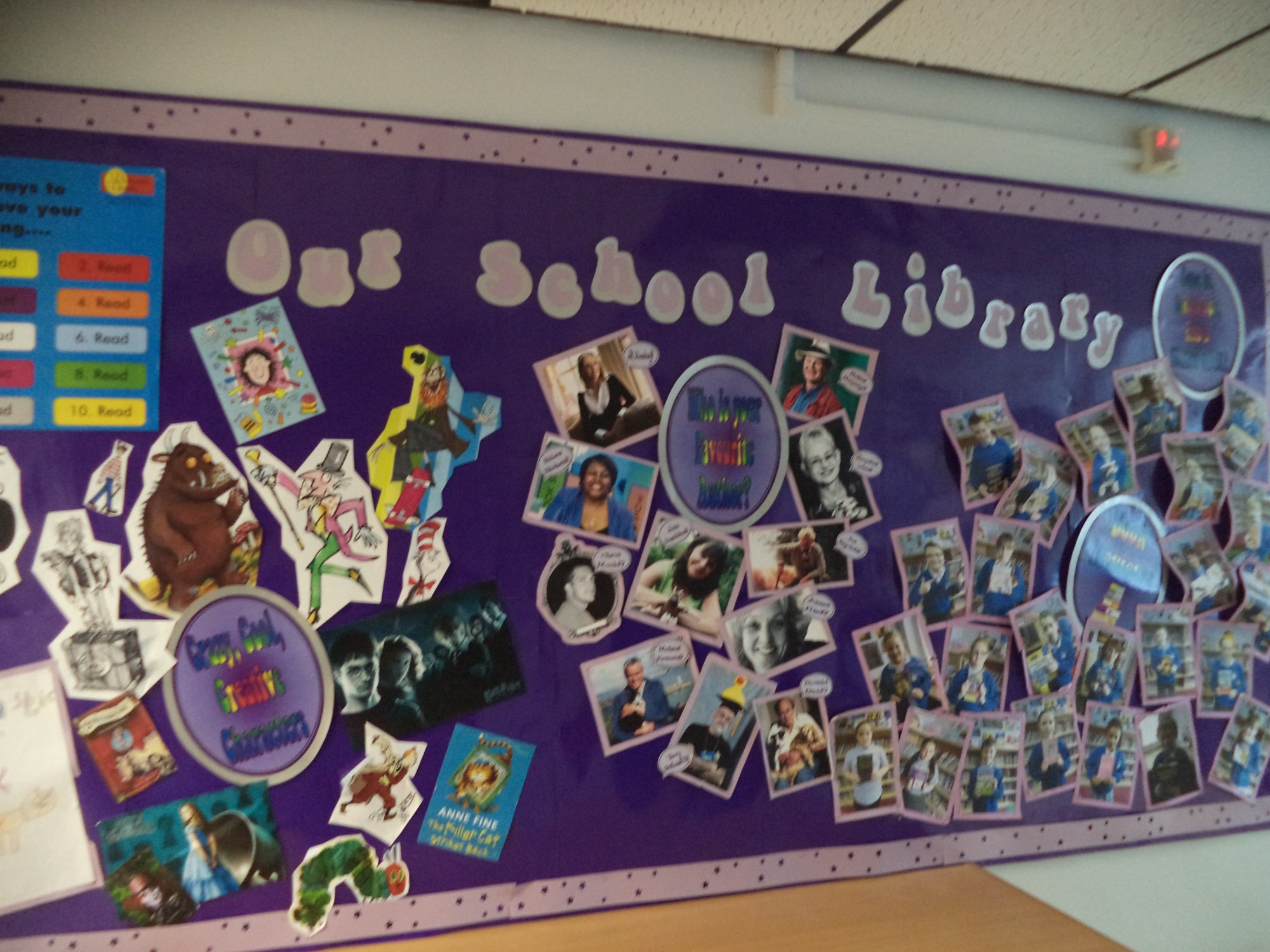At Bishop Martin we strive to develop a love of reading. Our reading curriculum shows the objectives from the National Curriculum but a love of reading is developed from more than just meeting these objectives.
Our School Library
We are currently working to combine and relocate our school library to its central location in the Junior building. The books in this library have been carefully chosen and organised so children can access a wide range of fiction, non-fiction and poetry which are matched to interest and curriculum themes. Each classroom also has a class library where children can relax and read for pleasure. We aim to make our libraries bright, attractive places to encourage reading for enjoyment.
Reading development
Every year we celebrate World book Day with a range of engaging and inspiring events such as book fairs, fancy dress days and author visits.
World Book Day 2023
We encourage parents to share books with their child from an early age. We promote home reading through the Book start packs which are given to nursery and reception children. Every child in school has access to an interactive online reading platform (Oxford Owl for children following Read Write Inc and Bug Club once they have left the programme). Children in Early Years and KS1 are encouraged to take home a reading book for parents to share and a home reading diary where parents are encouraged to log the reading activities and make comments where appropriate. There is a wealth of home reading materials for children have completed the Read Write Inc programme as they continue their reading journey.
Phonics
At Bishop Martin teachers and support staff in the EYFS (Early years Foundation Stage) unit and in KS1 (Key Stage 1) plan daily phonic activities following the Read Write Inc Programme.
Read Write Inc (RWI) is an inclusive phonics programme which helps all children learn to read fluently and at speed so they can focus on developing their skills in comprehension, vocabulary and spelling.
We hold regular Parent Workshops to share ideas of how you can support your child with reading at home.
RWI Parent Workshop March 2023
RWI was developed by Ruth Miskin and more information on this can be found at

https://www.ruthmiskin.com/en/
How will Early Reading/Phonics be taught?
All children are assessed regularly by our RWI teachers so they work with children at the same level. This allows complete participation in lessons.
Nursery
When appropriate, children will be introduced to the initial sounds in short sessions.
In nursery, children are introduced to 'pre-phonic learning', through a range of activies, children develop their speaking and listening skills and their awareness of sounds. Children working within pre-phonic teaching will:
- Explore and experiment with sounds and words.
- Distinguish between sounds in the environment and phonemes.
- Show awareness of rhyme and alliteration.
In Nursery, staff will play a variety of games and activities with the children and recognise that music has a key part in developing children’s language. Adult led activities involve modelling speaking and listening such as ‘Fred talk’ to model how to blend (Can you get your c-oa-t?). Interaction and talk with the children is critical to the success of pre-phonic activities and to promoting the children’s speaking and listening skills. We also expose children to letters that are familiar to them i.e. their name.
In Summer term, they continue to explore sounds but some move onto 'RWI for Nursery Children' where they explore making words with the letters they have learnt. All sessions are short, focused and of course fun! Children are split into groups and parents are informed on their development.
Reception
In Reception children have a daily phonics session with a trained member of staff using the Read, Write Inc. programme. Children are grouped according to their reading stage. Again, these sessions are fast paced, fun and focused. Children will learn how to ‘read’ the sounds in words and how those sounds can be written down.
Reading
The children:
- learn 44 sounds and the corresponding letters/letter groups using simple picture prompts
- learn to read words using Fred talk and sound blending
- read from a range of storybooks and non-fictions books matched to their phonic knowledge
- develop comprehension skills through stories
Writing
The children:
- learn to write and form the letters/letter groups which represent the 44 sounds with the help of fun phrases
- learn to write words by using Fred Talk
- learn to build sentences by practising sentences out loud before they write
Daily handwriting practice
Children practise correct letter formation as part of their daily Speed Sounds Lesson. We use the mnemonics to help children visualise the letter before they write it down. In the ‘Write the letters’ activity In the lesson, children practise saying the handwriting phrase and the sound as they form the letter in the air and then write the sound on paper. Children need to practise handwriting under the guidance of a teacher so they do not develop habits that will be difficult to undo later. When writing at home, please encourage your child to use the letter formation they have been practising at school.
The children work in pairs so that they:
- answer every question
- practise every activity with their partner
- take turns in talking and reading to each other
- develop ambitious vocabulary
Read Write Inc. Phonics through the day: Fred Talk and pinny time
The teaching of sounds is kept to the phonics lessons to let children enjoy the integrity of each experience. However, there are two important things to do throughout the day to help teach all children to read sounds and learn to blend quickly:
- Use Fred Talk and play Fred Talk games
- Pinny time.
Fred Talk + Speedy Sounds = reading
Fred Talk and Fred Talk games
Speaking like Fred helps children to understand that words are made up of sounds. Teachers and teaching assistants will use Fred Talk throughout the day to help children practise blending sounds together. Fred Talk follows a consistent routine:
- Say the word in sounds as Fred, e.g. c-a-t. Ask children to repeat. Pause to allow children to ‘jump-in’ with the whole word.
- Say the word in sounds followed by the whole word, e.g. c-a-t, cat. Ask children to repeat.
- Use Fred Talk for single-syllable words at the end of sentences throughout the day e.g. it is time for l-u-n-ch…lunch, come and sit on the f-l-oor…floor.
- Fred Talk words at the end of the sentence and keep the words short and simple.
Pinny time
Pinny time helps children to practise reading the sounds taught so far speedily and to make sure children ‘keep up, not catch up’.
- Each teacher/TA should has their own apron or ‘pinny’ with pockets containing a set of Speed Sounds Cards.
- 5-minute pinny time sessions are timetabled throughout the day. Children who need to increase their speed are targeted.
- ‘Speed minute’ sessions throughout the day - how many sounds the group of children can read in one minute?
- Pinny time can take place ANY time ANY place!
Year One
Children continue with the Read, Write Inc. programme but will work on complex sounds and read books appropriate to their reading level. Daily sessions of RWI phonics last for 30 minutes and is supported by additional reading in class. We understand that children move at different paces so we have carefully planned groups with our highly-trained staff. They are assessed regularly and regrouped according to their reading stage. A meeting is held to explain the Phonics Screening test to parents during the spring term. The phonics screening check is in June of Year 1.
Year Two
Children who still require Read, Write Inc. will stay on the programme. The children who did not pass the Phonics Screening Check will get the chance to take it again at key points throughout the academic year.
Some children may still need support with their reading, writing and confidence in this area. Teachers communicate the children’s needs and parents are informed on progress. Children are supported differently in class depending on their needs.
Children will be taught how to read as follows:
Before you start to teach your child, practise saying the sounds below. These are the sounds we use to speak in English.
Fred Talk
We use pure sounds (‘m’ not’ muh’,’s’ not ‘suh’, etc.) so that your child will be able to blend the sounds into words more easily.
At school we use a puppet called Fred who is an expert on sounding out words! we call it, ‘Fred Talk’. E.g. m-o-p, c-a-t, m-a-n, sh-o-p, b-l-a-ck.
The children are taught the sounds in 3 sets.
Step 1:
Set 1 Sounds are taught in the following order together with rhymes to help children form the letters correctly and instantly recognise sounds ready for blending. (We don’t use letter names at this early stage.) Children will also use pictures for each sound to help recognise the sound and then form the shape of the sound.
Step 2:
The children are then taught Set 2 Sounds - the long vowels. When they are very confident with all of set 1 and 2 they are taught Set 3 Sounds.
Shared reading/guided reading/independent reading
In English lessons teachers may plan reading activities where the whole class will focus on a shared text. The text may be linked with themes and is carefully selected to ensure that the children can learn from the structure and content of the text. During guided reading sessions, teachers work with small groups, again using carefully selected texts, to help the children to develop their reading skills. Comprehension skills are developed through a wide range of tasks which may be group, paired or individual tasks.
Click here to link to the National Curriculum Website for further information on the English National Curriculum.
Book Recommendations
Reception
Year 1
Year 2
Year 3
Year 4
Year 5
Year 6
See below for some useful information to help with...
...READING
BookTrust
Click on the image below to see the Top 100 Best Children's Books.
...SPELLING
Click on the image below for games and activities to help your child with spelling.
... GRAMMAR
Click on the image below for information to help you support your child with grammar.
.png)














